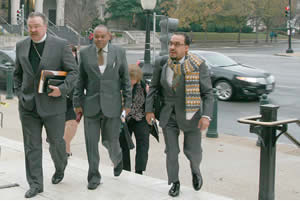 “So, now we can just walk into the office?”
“So, now we can just walk into the office?”
That’s what Rogath Lewis Mollel of the Evangelical Lutheran Church in Tanzania (ELCT) said to me as we made our way into the Cannon House Office Building on Capitol Hill. I responded with a surprised “yes.” Rogath was amazed with the amount of access he and the average U.S. citizen have to our elected officials in Washington, DC. As an American it’s easy to take for granted; recently Rogath, along with nearly 20 representatives of the Lutheran Malaria Initiative from Africa and the United States, saw firsthand the power of advocacy.
The Lutheran Malaria Initiative (LMI) mobilizes U.S. Lutherans in the global effort to end malaria deaths in Africa and is a partnership between Lutheran World Relief and The Lutheran Church-Missouri Synod. This campaign is made possible by the generous support of the UN Foundation and church members. Since 2010, LMI has engaged U.S. Lutherans from all walks of life in the fight against malaria. With the support of U.S. Lutherans, we have been able to reach communities in Kenya, Tanzania, Nigeria, Mali, and Uganda with life-saving malaria education, prevention, and treatment.
While much of our campaign has focused on U.S. Lutherans, recently LMI held its first advocacy day on Capitol Hill. We shared with several members of Congress and their staffs the work of LMI, the importance of continued U.S. bilateral funding for anti-malaria programs, and strong support for The Global Fund to Fight AIDS, Tuberculosis and Malaria. The trip was an outstanding follow-up to an August observation trip to Tanzania with the UN Foundation to show congressional staffers LMI’s work in action. Back on the Hill, representatives from LMI shared examples of why U.S. funding is vital to ending malaria deaths. Several staffers encouraged the LMI representatives to continue their dialogue with Congress. They said that hearing about the commitment of their constituents to fighting this disease and the encouraging stories from communities in Africa that are seeing real change helps them understand the importance of U.S. dedication to ending malaria deaths.
In Tanzania, one of the LMI partners initially received a USAID grant from the President’s Malaria Initiative. This money helped establish major malaria prevention programs that helped increase access to bed nets and medication in ELCT health clinics, which are now funded by LMI. This initial support from the U.S. government helped LMI to ramp more quickly than it could have done without it. It also meant LMI could reach an additional 2 million people in Tanzania with malaria treatment and prevention. As a donor to The Global Fund, LMI understands the need to build country-level capacity to fight and treat malaria. LMI considers The Global Fund’s role in ending malaria deaths so valuable to our African partners that we direct 30 percent of all LMI funding through the organization. We are hopeful that the U.S. government will continue supporting The Global Fund.
As we finished up our meeting with a staffer in the Cannon House Office Building, Rogath made a point to thank him for the American people’s support. He said he was grateful for their concern for his country and for those suffering from malaria, and he hoped that the U.S. would stay committed to ending malaria in this generation.
Photo Caption: Lutheran leaders visit Capitol Hill seeking support of malaria prevention programs. From left to right: Matt Harrison, President of The Lutheran Church-Missouri Synod; Eliuphoo Sima, Retired Bishop of the Central Diocese-Evangelical Lutheran Church in Tanzania; and John Nunes, President and CEO of Lutheran World Relief.



 View All Blog Posts
View All Blog Posts